The Albanese government is toast
I’m writing this from Yufuin, a lovely little town in northern Kyushu, Japan. If you’ve never been to Japan, there has rarely been a better time to go: the yen is at parity with the Australian dollar, the first time since the peak of the last mining boom in 2013-14 and before that, 2007-08.
Japan’s domestic consumer prices have also consistently grown more slowly than Australia’s, so when the currencies are of equal strength it makes for a relatively affordable trip to a country full of friendly people and wonderful attractions.
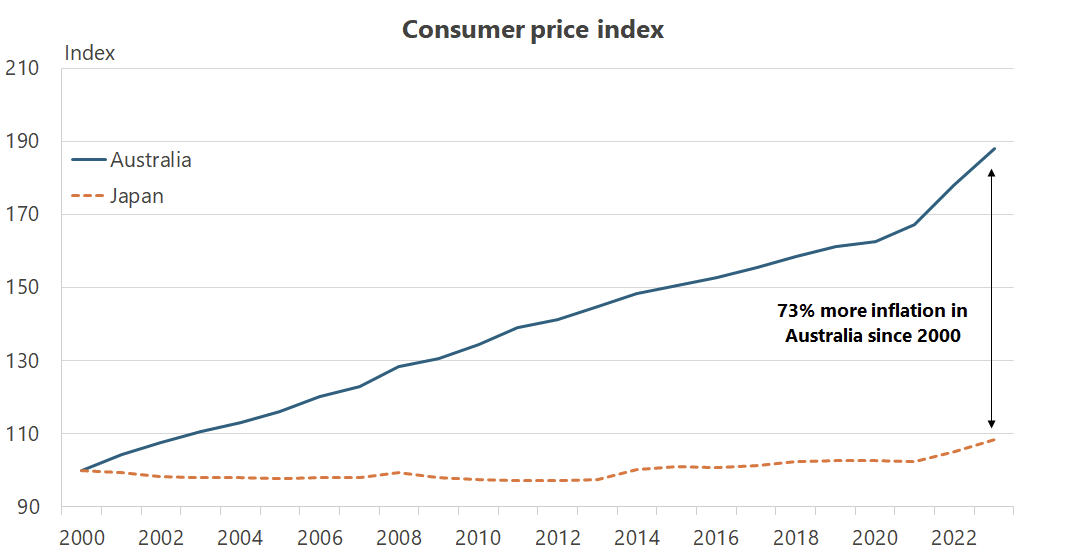
But enough about Japan, which is certainly not without its problems, as I’ve written about before. What I want to discuss today is the Albanese government, which is showing many of the tell-tale signs of a late-stage leadership so bereft of ideas that it will pass literally anything so long as it’s something. Or as Shane Huntley called it on X, the politician’s fallacy:
- Something must be done.
- This is something.
- Therefore, we must do this.
Seemingly desperate for a win, PM Anthony Albanese confirmed that social media age restrictions will be rushed through Parliament this month:
“Albanese and the communications minister, Michelle Rowland, did not rule out the potential for social media users to have their faces subject to biometric scanning, for online platforms to verify users’ ages using a government database, or for all social media users – regardless of age – being subject to age checks, only saying it would be up to tech companies to set their own processes.
…
The onus would be on social media platforms to ‘demonstrate they are taking reasonable steps to prevent access’ for young people, Albanese said. There would be no penalties for users who managed to access social media under the age of 16, or their parents, but Rowland said there would be penalties for platforms that did not heed the new laws.”
Make no mistake, this is an excessively overbearing, paternalistic ‘cure’ for a ‘disease’ that may not even exist; even parental consent won’t be sufficient for kids to use social media platforms under these laws.
For those who want to know more, I’ve written about the supposed harms of social media and this ‘solution’ a few times already. In order of recency:
- It’s not about the children
- Social media age limits are based on junk science
- The social media Trojan Horse
- A pocket full of poison?
Even if you thought social media was the devil and completely ignored its benefits, age verification for something that exists in purely digital form will open a pandora’s box of unintended consequences. This won’t be like a clerk checking your driver’s licence at the bottle shop; no, this will require uploading some form of biometric identification to every social media website or app that you use.
Personally, the first thing I did when I saw that Albo was going to push this through was change my VPN’s location from Australia to New Zealand. Why? Because the last thing I want is for foreign “social media” companies – defined to be so broad as to include YouTube, messaging apps, and even gaming services like Xbox Live – to store my biometric information just so I can watch a video about how to replace the wheel on my skateboard. You can’t change your face or fingerprint so when a social media company is inevitably breached, millions of Australians will be up shit creek without a paddle.
I feel like I write this far too often that I should have to, but good policy must ensure that the benefits exceed the costs. The harm must be clear and the proposed mitigation must be beneficial and enforceable. That means considering all unintended consequences, thinking through the second- and third- order behavioural effects, and so on. Things like:
- Will the next great learning and education platform just decide that Australia’s unclear laws aren’t worth the risk and Australian kids end up just locked out?
- Circumvention will be common and routine. Circumvention tools and systems will push disrupt real moderation and controls and expose users to other risks.
- It’s much easier to fight bullying, harassment and harmful content on major platforms than it will be if youth are inevitably pushed to underground forums.
- We could end up disrupting the benefits of the modern internet, creating new privacy and security risks for all Australians, while our youth move on to more dangerous and unregulated spaces.
None of that appears to have been considered. In fact, once again the Albanese government looks to have achieved the opposite, and will likely cause more harm than it’s preventing. Why? Because Albanese is a tyrant who wants to quell whatever semblance of free speech we have left in Australia (and it’s not much):
“Australian Prime Minister @AlboMP was asked what he would do first if he was a dictator, he answered: “Ban social media. Keyboard warriors can anonymously say anything at all. Without any fear’.”
It was never about the children; age limits for social media will achieve Albo’s dictator dream of being able to identify the “keyboard warriors” criticising him, at least until they figure out how to use a VPN – so for about five seconds.
Politically, I see this as an absolute own goal for Albanese government, which has amazingly managed to unite both sides of politics against it on this issue. Meanwhile, it’s a freebie for opposition leader Peter Dutton, who is also an anti-free speech tyrant yet has now achieved one of his dreams at the cost of zero political capital.
Which brings me to another point. If this is the best policy the Albanese government can negotiate – it has more than 20 bills stalled in the Senate for various reasons (many due to its own pigheadedness), and has no notable economic policy achievements or ideas – what chance does it have in the next election?
Voters want someone to blame
As I discussed on Monday, inflation played a major role in the recent US election. And I think it’s going to play an equally important role in the next Australian federal election, to be held before May 2025.
To be clear, I don’t think the Albanese government is responsible for the inflation we’ve been experiencing throughout its term. Most of the seeds were planted by Scott Morrison and Josh Frydenberg, who – with the full backing of the Reserve Bank of Australia (RBA) – stimulated demand to excess.
But the Albanese government is not without blame. While in opposition, Treasurer Chalmers was criticising the Morrison government for not stimulating the economy by even more! Moreover, since being elected they have done nothing to rein in the excess of years past; in fact, they – along with the mostly Labor-led state governments – have increased spending to the point where the RBA has been forced to publicly condemn it.
Economist Steven Hamilton recently contrasted the Australian experience with the American one:
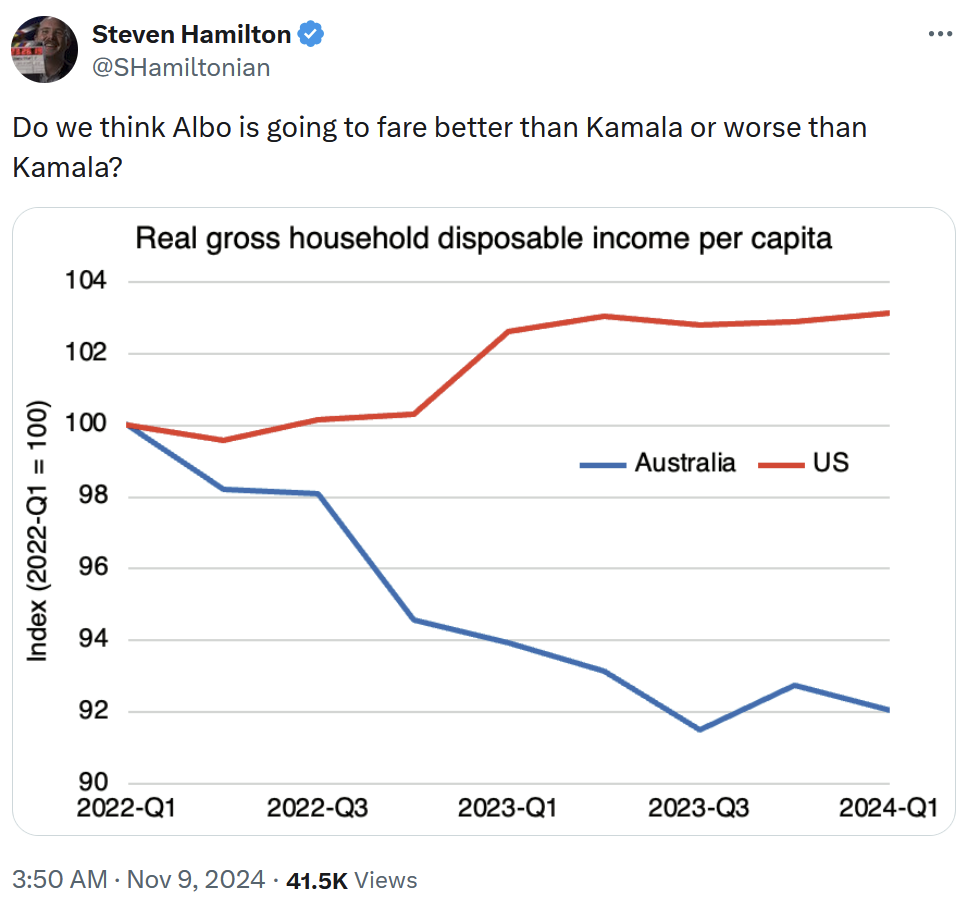
There are a few reasons why this chart is misleading. The first is the starting point: unlike the US, Australia closed its borders for much of the pandemic. During that time immigration was virtually non-existent; in fact, the country’s population nearly declined:
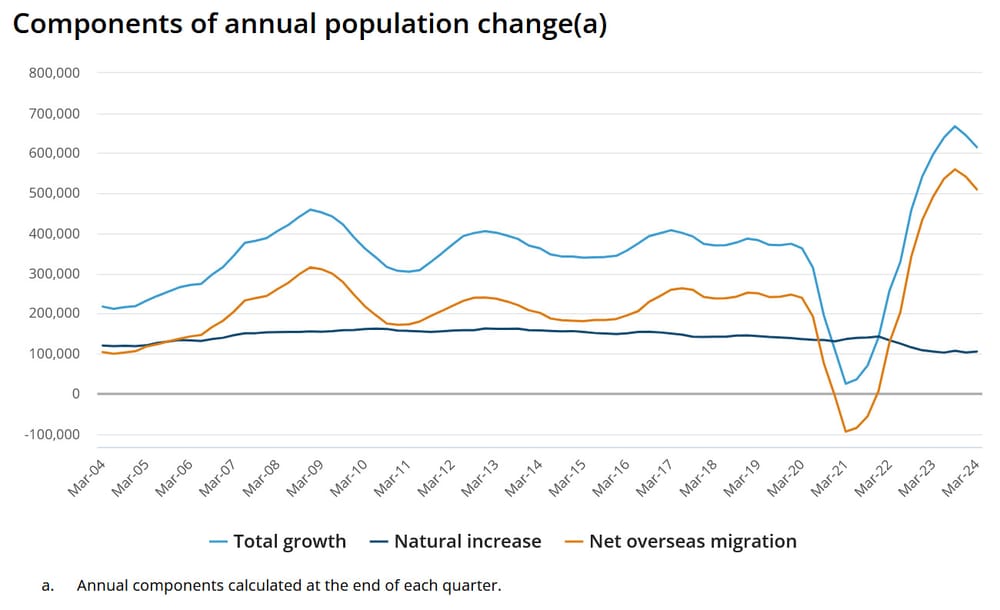
In a per capita chart, population is the denominator. By choosing a point just before the temporary catch-up migration surge started, Hamilton’s chart makes the Australian experience look worse than it has been. I would have used a longer time series and labelled the Albanese government’s starting point on it, like this:
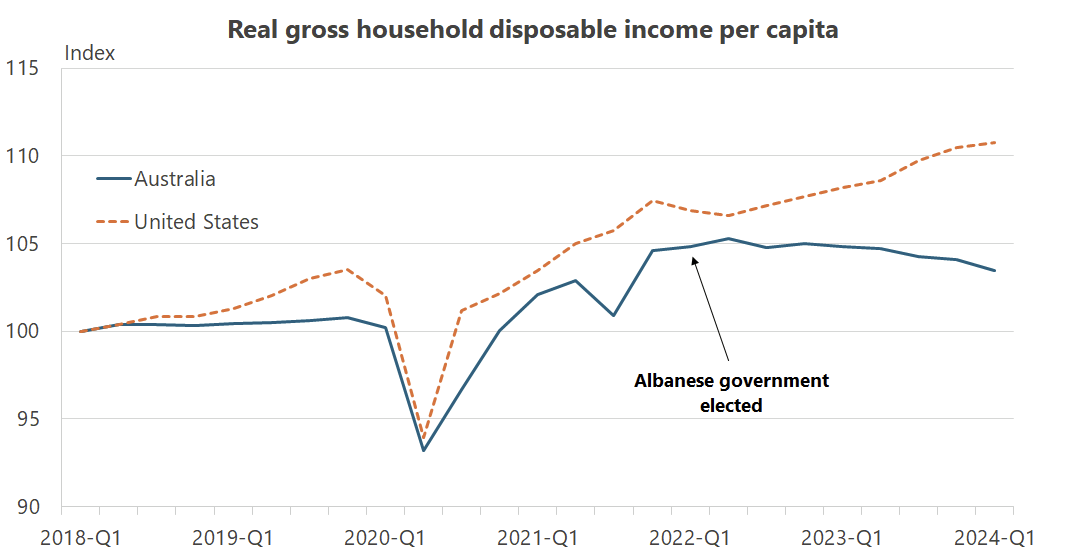
The second reason why it’s misleading is due to the numerator. International students, backpackers and other temporary residents are included in Australia’s population, but they tend to work in low-productivity jobs and fewer hours, e.g. in the gig economy. The US also had a surge of post-pandemic migration, but it was much smaller as a share of its total population than Australia’s: in 2022-23, annual population grew by around 0.5% in the US versus nearly 2.5% in Australia.
The economies are also built differently. In Australia, most indebted households have mortgages with variable-rates, while in the US they’re almost all on 30-year fixed rates. All else equal, that will tend to flatter the numerator in the US because while incomes in both countries increased, only in Australia are mortgage repayments pegged to interest rates. Disposable incomes in Australia, one of the most mortgage-indebted countries in the world, were always going to be lower.
Put it all together, and during a period of global inflation it was inevitable that US households would look significantly better than Australia in the aggregate – i.e. as measured by real gross household disposable income per capita – regardless of who happened to be occupying Parliament House.
That’s not to say that the Australian situation hasn’t been tough for punters. As I wrote earlier this week, many people have just gone through a permanent loss in real wealth, and it happened on Albanese’s watch. It doesn’t matter that incomes are probably around where they would have been absent the pandemic; what matters is that people felt really good for a while – largely due to temporary government transfers – and are now in the hangover phase:
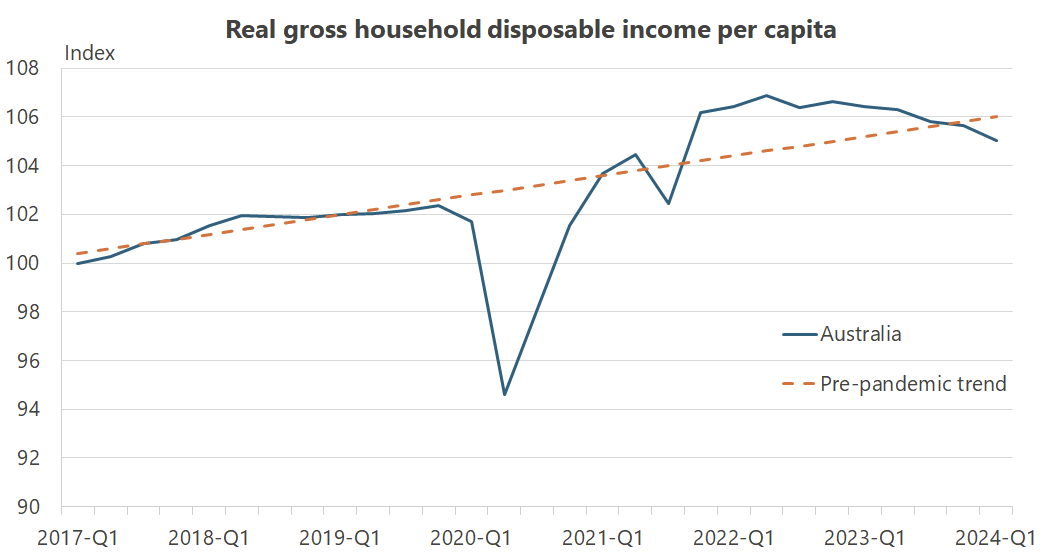
But despite all those caveats, there’s a good chance that the Albanese government is going to be punished at the ballot box. Just like virtually every other inflation-incumbent government this year:
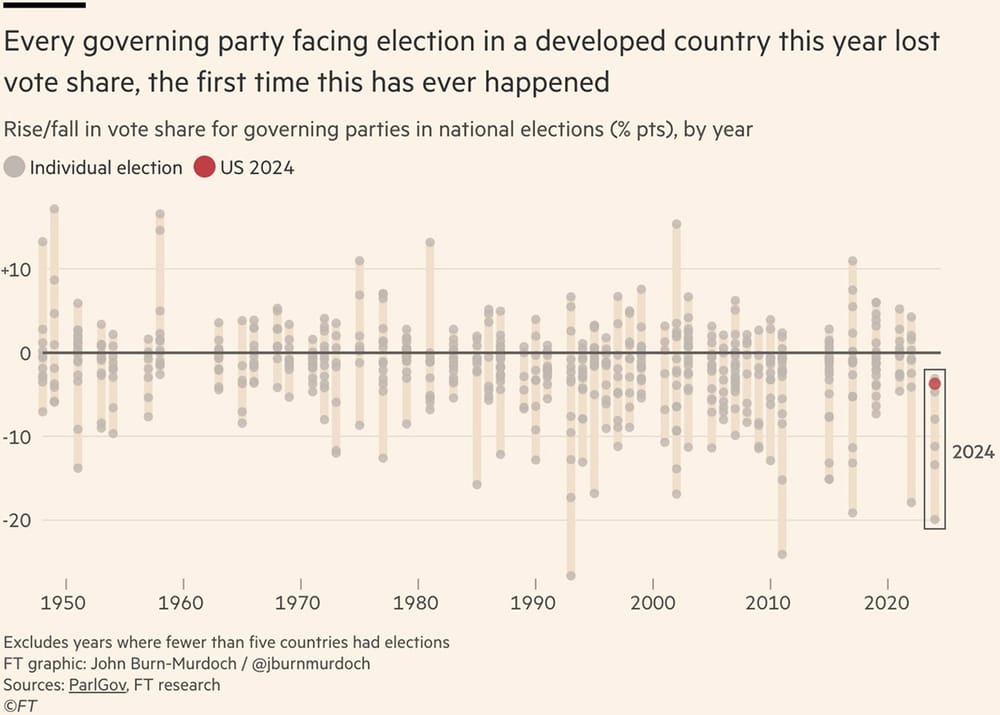
Research suggests that people tend to take credit for “earning” nominal pay rises, yet blame other forces – e.g. governments, greedy businesses – for rising prices.
While there aren’t prediction markets for political races in Australia this far out, there are betting websites. And if those are any indication – they also called the Trump victory – then as a $2.0 outsider, Albo has plenty of work to do.
But if social media age verification, an Orwellian misinformation bill that will censure “opinion”, endless supermarket inquiries despite no increase in razor-thin margins, and calling Dutton “negative, nasty” (because that worked out so well for Kamala Harris) are the best distractions this government can offer before the next election then, well… it’s toast.
Comments
Comments have been disabled and we're not sure if we'll ever turn them back on. If you have something you would like to contribute, please send Justin an email or hit up social media!
